MercoPress. South Atlantic News Agency
Tag: Jose Maria Arancedo
-
Saturday, April 15th 2017 - 10:17 UTC
Argentina “a divided country”, which needs to promote the “culture of dialogue and honesty”
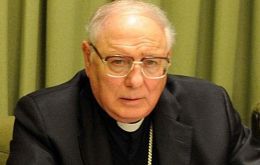
Argentina is “a divided country and does not solve the problems of the people”, said the Catholic Church in its Easter message, demanding a “culture of dialogue and honesty” in the framework of the country's institutions.
-
Monday, October 24th 2016 - 11:42 UTC
Catholic Church and Macri have a 'mature relation of autonomy and cooperation'
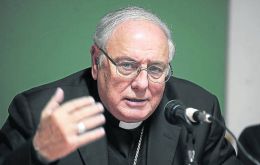
The relation between the Catholic church and the administration of president Mauricio Macri is “a mature relation” and “links are as they should be”, and this is based on “autonomy and cooperation which is good for both sides”, according to Monsignor Jose Maria Arancedo, head of the Argentine Episcopal Conference, CEA.
-
Thursday, December 3rd 2015 - 07:24 UTC
Francis non papal message to Macri: 'a simple matter of protocol'
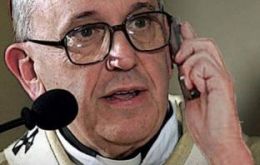
How come the Argentine born pope Francis did not send a congratulation telegram, or formal message to president elect Mauricio Macri on his victory, has been an ongoing question. But Vatican sources pointed out there was no special reason for that attitude, but merely “a simple matter of protocol”.
-
Friday, October 2nd 2015 - 06:24 UTC
Argentine Catholic church calls for elections to be held with 'transparency'

The Argentine Catholic Church called for the upcoming presidential elections on 25 October to be held with “transparency” and urged candidates to present “their proposals and ideas with clarity” and regretted a climate “which debilitates the credibility of persons and institutions”.
-
Monday, June 15th 2015 - 06:44 UTC
Catholic Church points out that 25% of Argentines are below the poverty line
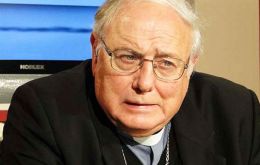
The Argentine Catholic Church has stood out strongly on the controversy that has followed President Cristina Fernandez statement before the FAO assembly in Rome arguing that poverty in Argentina is below 5%, which was later made superlative by her spokesperson and cabinet chief Anibal Fernandez arguing that poverty in Argentina was less than in Germany or Denmark.
-
Friday, April 19th 2013 - 05:33 UTC
Argentine Catholic Church criticism of judicial reform triggers ironic statements from Senator
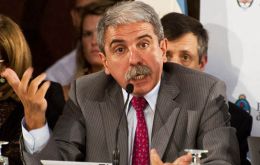
The Cristina Fernandez administration renewed relations with the Catholic Church, since the naming of Cardinal Bergoglio from Buenos Aires Pope Francis could be facing their first challenge because of the controversial judicial reform the Argentine president is pushing through congress.
-
Monday, February 13th 2012 - 05:33 UTC
Argentine Church calls on government and opposition not to take advantage of Malvinas dispute

The Argentine Catholic Church supports the country’s claim over the Falklands/Malvinas Islands but also called on the Executive and the rest of the Argentine leadership not to use the Malvinas issue with a political purpose.
